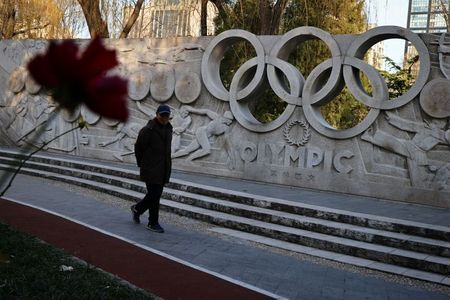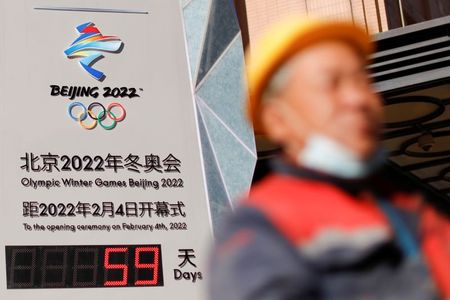By Gabriel Crossley and Yew Lun Tian
BEIJING (Reuters) – China on Tuesday accused the United States of betraying Olympic principles and said Washington would “pay a price” for its diplomatic boycott of the upcoming Winter Games in Beijing even as a top International Olympic Committee official voiced respect for the U.S. decision.
The White House announced on Monday that U.S. government officials will boycott the Winter Olympics over China’s human rights “atrocities,” though the action allows American athletes to travel to Beijing to compete.
Many key U.S. allies have hesitated follow the U.S. move, but on Wednesday, Australia said it would join the diplomatic boycott.
President Joe Biden’s administration cited what the United States calls genocide against minority Muslims in China’s far western region of Xinjiang. China denies all rights abuses.
In Beijing, Chinese foreign ministry spokesman Zhao Lijian told a media briefing that his country opposes the U.S. diplomatic boycott and promised “resolute countermeasures” in response.
“The United States will pay a price for its mistaken acts,” he said, without giving details. “Let’s all wait and see.”
The IOC, the governing body of the worldwide Olympic movement, held executive board meetings on Tuesday at its headquarters in Lausanne, Switzerland, ahead of the Winter Games scheduled for Feb. 4-20 in Beijing.
“We always ask for as much respect as possible and least possible interference from the political world,” said Juan Antonio Samaranch, the IOC’s coordination commission chief for the Beijing Olympics. “We have to be reciprocal. We respect the political decisions taken by political bodies.”
The Winter Games are due to begin about six months after the conclusion of the Summer Games in Tokyo, which were delayed a year because of the COVID-19 pandemic.
“We are extremely proud, happy and hopeful that all athletes of the world will live in peace in 59 days,” Samaranch said, referring to the scheduled start of the Winter Games.
Members of the Uyghur Muslim ethnic group living in Turkey welcomed the U.S. boycott.
Rights groups and U.S. lawmakers have called on the IOC to postpone the Games and relocate them unless China ends what the United States deems genocide against ethnic Uyghurs and members of other Muslim minority groups.
The United States is set to host the 2028 Summer Olympics in Los Angeles and is preparing a bid to host the 2030 Winter Olympics in Salt Lake City.
Asked whether China would consider a diplomatic boycott of Olympic Games in the United States, Zhao said the U.S. boycott has “damaged the foundation and atmosphere” of sports exchange and cooperation on the Olympics, which he likened to “lifting a stone to crush one’s own foot.”
He called on the United States to keep politics out of sports, saying the boycott went against Olympic principles.
The American diplomatic boycott, encouraged for months by some members of the U.S. Congress and rights groups, comes despite an effort to stabilize ties between the world’s two largest economies, with a video meeting last month between Biden and China’s Xi Jinping.
‘THE ONLY OPTION’
Bonnie Glaser, a China expert at the German Marshall Fund of the United States, told a U.S. congressional hearing on Tuesday that unless other countries join the boycott it would undermine the message that China’s human rights abuses are unacceptable.
“Now I think the only option really that is available to us is to try to get as many countries as we can to stand with us in this coalition,” Glaser said.
Announcing Australia’s plans to join the boycott, Prime Minister Scott Morrison said Beijing had not responded to several issues raised by Australia including alleged human rights abuses.
“So it is not surprising therefore that Australian government officials would not be going to China for those Games,” Morrison told reporters in Sydney.
Relations between Australia and China, its top trade partner, are at a low ebb over after Canberra banned Huawei Technologies from its 5G broadband network in 2018 and called for an independent investigation into the origins of COVID-19.
Beijing responded by imposing tariffs on several Australian commodities, including coal, beef, barley and wine.
Canada’s foreign ministry said on Monday it continues to discuss the matter with partners and allies. Britain, the Netherlands and Japan said they were still considering their positions. New Zealand’s deputy prime minister said the country would not send government officials but that decision was based largely on COVID-19 concerns.
Chinese media and scholars criticised the U.S. action.
“It is foolish and silly of the United States to do this,” Wang Wen, a professor at Renmin University in Beijing, told Reuters, adding other major powers could do the same to the United States in 2028.
The diplomatic boycott puts corporate Olympic sponsors in “an awkward spot” but causes less concern than a full measure barring athletes, said Neal Pilson, a former president of CBS Sports who has overseen Olympics broadcast rights deals.
The U.S. bipartisan Congressional-Executive Commission on China applauded Biden’s decision and called on Olympic corporate sponsors to announce similar attendance boycotts, saying a diplomatic boycott alone was not enough.
“Business as usual is not acceptable given the atrocities being committed by the Chinese government,” said commission chair Senator Jeff Merkley, a Democrat from Oregon, and co-chair Representative James McGovern, a Democrat from Massachusetts.
(Reporting by Gabriel Crossley, Yew Lun Tian, Trevor Hunnicutt, Karolos Grohmann, Michael Martina, Steve Keating and Renju Jose; Editing by William Maclean, Will Dunham, Rosalba O’Brien, Lincoln Feast and Gerry Doyle)









